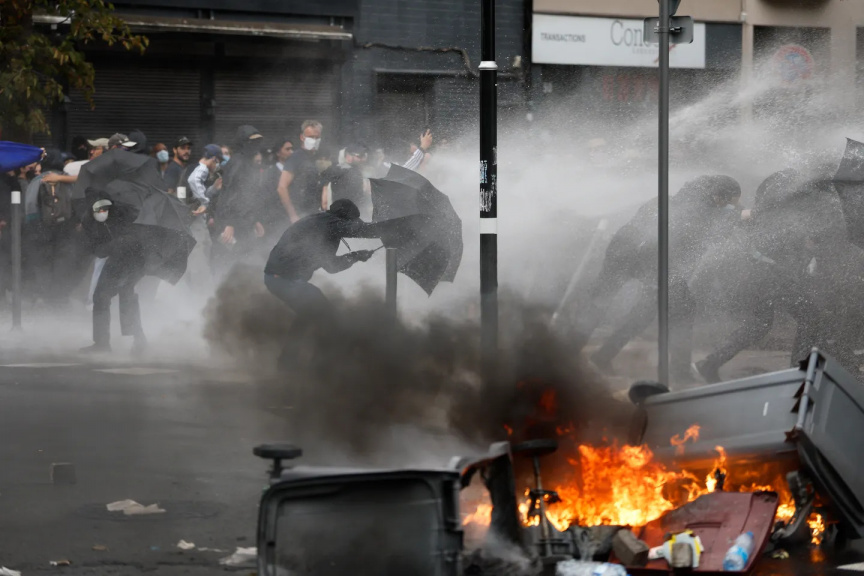
Protesters of the "Block Everything" movement take cover of a water cannon behind umbrellas in Lille, northern France . (Photo/AP)
Nearly 200,000 people across France took part in protests as part of the "Block Everything" movement, Interior Minister Bruno Retailleau announced at a press conference.
Retailleau said on Wednesday that young people were "particularly represented" in the protests, which he accused of being "hijacked by far-left and ultra-left movements."
He insisted that despite "very, very numerous attempts" to paralyse the country, "blockers did not block France."
The protests gave rise to a total of 812 protest actions nationwide, according to official figures.
In the capital, clashes broke out near several strategic locations, including Porte d'Aubervilliers, high schools and the Gare du Nord railway station.
Police used tear gas to disperse demonstrators as several trash bins were set on fire.
In the downtown Chatelet neighbourhood, a building caught fire, prompting a major intervention by firefighters.
The Forum des Halles shopping centre in central Paris was closed after calls for looting as protesters marched towards the site.
The Directorate General of Civil Aviation also announced air traffic disruptions at Marseille, Nice, Bastia, Ajaccio, Figari and Calvi airports, with delays and cancellations expected later in the day.
Around 295 people have been arrested nationwide in the protests, Retailleau said earlier.
He also accused some politicians of attempting to "create an insurrectional climate in France."
'Les Essentiels'
The grassroots protest that started on social media urged citizens to "Block Everything" on September 10 with the aim of bringing the country to a halt in opposition to outgoing Prime Minister Francois Bayrou's national budget plan.
Gaining momentum with the support of the far-left France Unbowed (LFI) party, the movement originated with a small online group "Les Essentiels," saying: "On Sept. 10, we stop everything, not to escape, to say no."
Meanwhile, French trade union organisations also called for a day of mobilisation across the country on September 18 to protest Bayrou's budget proposals.
France is facing mounting political tensions as Bayrou lost a confidence vote in the National Assembly on Monday.
Bayrou, who unveiled a 2026 budget framework in July, was seeking support for a plan to save nearly $51 billion as part of efforts to reduce France’s soaring public debt, now at 113 percent of its GDP.
French President Emmanuel Macron appointed Armed Forces Minister Sebastien Lecornu as the country's new prime minister on Tuesday. He has been tasked with holding consultations with political parties before forming his government.
France has one of the European Union's largest budget deficits at 5.8 percent of GDP.
Budget negotiations have been a major source of tension in French politics.
The failure to reach an agreement on the 2025 budget last year led to the collapse of the Michel Barnier government in December after left-wing and far-right parties united behind a no-confidence motion.
___
Source: TRT